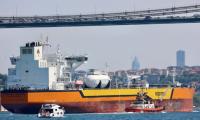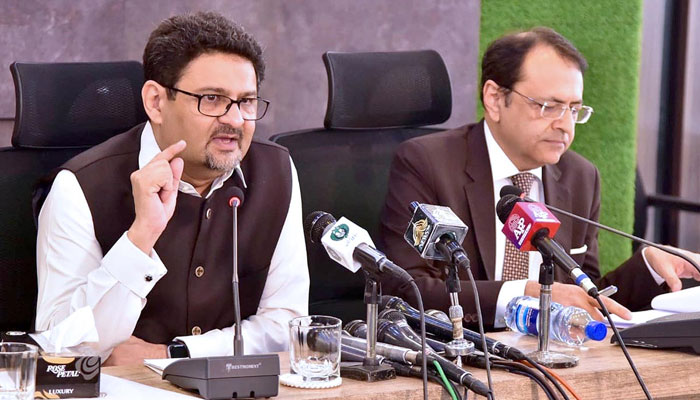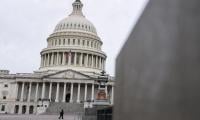Hike in POL prices pushed up inflation: Miftah
Finance Minister Miftah Ismail conceded that the hike in POL prices had pushed up inflationary pressures in the country but there was no other choice but to take tough decisions
ISLAMABAD: Minister for Finance Miftah Ismail on Friday conceded that the hike in POL prices had pushed up inflationary pressures in the country. However, he added that there was no other choice but to take tough decisions for hiking the POL prices for averting bankruptcy.
“There were two choices before us, either to face a Sri Lanka-like situation and allow rupee to depreciate to touch Rs400 against US dollar after facing default or take tough decisions through withdrawal of huge subsidy and pass on international prices to domestic consumers. We took the tough decision and increased the POL prices,” Federal Minister for Finance Miftah Ismail said while addressing a news conference here at the state-run TV headquarters along with FBR Chairman Asim Ahmad on Friday.
The minister said that the IMF had shared the Memorandum of Economic and Financial Policies (MEFP) and now the government was reading it carefully and did not want to move ahead in haste. “It is expected that the parleys on MEFP will be finalised in a few days and then staff level agreement will be struck,” he added.
The minister said that the PTI had signed an agreement with the IMF for raising the petroleum levy of Rs4 per litre, increase it up to Rs30 per litre in a gradual manner and then slap 17 percent GST on POL products. If the incumbent regime had implemented the agreement struck by the PTI-led regime, the petrol price should have gone up by Rs75 per litre and diesel by Rs81 per litre. However, the incumbent regime raised petrol price by Rs14.85 per litre and imposed petroleum levy of Rs10 per litre while on diesel the Rs5 per litre levy was imposed.
He said that the incumbent government could not afford Rs120 billion subsidy on POL products on monthly basis. They preferred to pass on international prices to consumers.
The minister praised the performance of FBR and said that they exceeded the envisaged target and collected Rs6,125 billion in the last financial year 2021-22 ended on June 30, 2022. He said that he had given the FBR a target of Rs6,050 billion but the FBR surpassed its upward revised target of Rs6,100 billion.
FBR Chairman Asim Ahmad said, on the occasion, that the tax machinery would utilise technology for broadening of tax base and now 0.7 million retailers would be brought into the fixed tax regime announced by the government in the budget 2022-23 for collection of fixed tax through electricity bills. He said that the Track and Trace System would be implemented on tobacco after vacating the stay orders from High Court.
He said that the FBR started obtaining data from Nadra for achieving the objective of broadening of tax base as the first set of data was shared by Nadra to ascertain how the base could be broadened.
He said that two more sectors would be brought under the Track and Trace System, including fertilizer and cement sector during the current fiscal year 2022-23. The government had implemented Track and Trace System on tobacco manufacturers and sugar industry. However, some tobacco sector players had approached Peshawar High Court and obtained stay orders. However, the formal tobacco sector such as Pakistan Tobacco Company had installed Track and Trace System in its Jhelum factory from the last fiscal year. “Now the stay order has been vacated and implementation on Track and Trace System will be implemented from July 1, 2022,” the Chairman FBR said.
The Track and Trace system will install stamps on production of selected sectors and it will help the FBR in overcoming massive tax evasion. In case of tobacco sector, if the Track and Trace system is installed on all domestic and multinational players, then it could help achieve the desired objectives. However, if the illicit cigarettes continue to sell unabated, then it will not help achieve the real objectives of the system. The chairman FBR said that the FBR would bring 4000 tier-1 retailers integrated with Point of Sale (POS) during the current fiscal year.
-
 T.I. Says Sons Crossed A Line During His Feud With 50 Cent
T.I. Says Sons Crossed A Line During His Feud With 50 Cent -
 Brooklyn Beckham Ignores Victoria, David Peace Call, Responds To Nicola Peltz Instead
Brooklyn Beckham Ignores Victoria, David Peace Call, Responds To Nicola Peltz Instead -
 Prince Harry, Meghan Markle Can No Longer Be ‘DIY Royals’
Prince Harry, Meghan Markle Can No Longer Be ‘DIY Royals’ -
 Keke Palmer Gets Candid About 'dehumanizing' Child Star Experience
Keke Palmer Gets Candid About 'dehumanizing' Child Star Experience -
 Shamed Andrew Brand ‘most Arrogant’ By Diana Bodyguard
Shamed Andrew Brand ‘most Arrogant’ By Diana Bodyguard -
 Daniel Radcliffe Welcomes New 'Harry Potter' Era, Says It's Time To 'pass It On'
Daniel Radcliffe Welcomes New 'Harry Potter' Era, Says It's Time To 'pass It On' -
 AI Rivalry: Anthropic Investors Push To De-escalate Pentagon Clash Over AI Safeguards, Sources Say
AI Rivalry: Anthropic Investors Push To De-escalate Pentagon Clash Over AI Safeguards, Sources Say -
 Selena Gomez Reveals Handmade Birthday Gift Taylor Swift Created For Her
Selena Gomez Reveals Handmade Birthday Gift Taylor Swift Created For Her -
 Jamie Lee Curtis Doubles Down On Her Assertion About 'The Bear's Imminent End
Jamie Lee Curtis Doubles Down On Her Assertion About 'The Bear's Imminent End -
 Nicole Kidman Reacts To Daughters' Possible Future In Hollywood
Nicole Kidman Reacts To Daughters' Possible Future In Hollywood -
 Harry Styles Weighs In On The Origins Of His Muse While Talking About 'Carla’s Song' From Upcoming Album
Harry Styles Weighs In On The Origins Of His Muse While Talking About 'Carla’s Song' From Upcoming Album -
 Alarming: New Research Suggests Global Sea Levels Have Been Underestimated Due To Flawed Modelling
Alarming: New Research Suggests Global Sea Levels Have Been Underestimated Due To Flawed Modelling -
 Jason Biggs Speaks Of A Possible American Pie Sequel
Jason Biggs Speaks Of A Possible American Pie Sequel -
 Meghan Markle Elated As ‘As Ever’ Proves To Be ‘double Edged Sword’
Meghan Markle Elated As ‘As Ever’ Proves To Be ‘double Edged Sword’ -
 Gulf Shipping Crisis Deepens Amid Geopolitical Tensions: Can Global Powers Manage Oil Supply Shortfall?
Gulf Shipping Crisis Deepens Amid Geopolitical Tensions: Can Global Powers Manage Oil Supply Shortfall? -
 Nicole Kidman Suffers From An Alarming Condition As She Experiences Emotional Fallout Amid Keith Urban Split
Nicole Kidman Suffers From An Alarming Condition As She Experiences Emotional Fallout Amid Keith Urban Split




